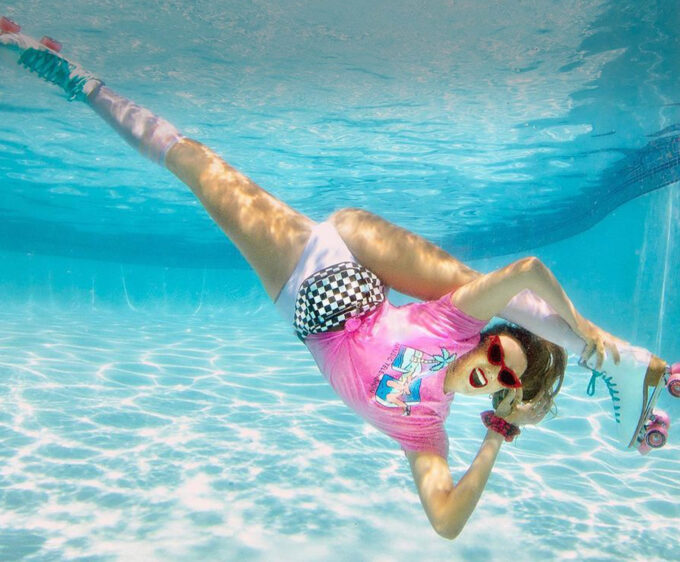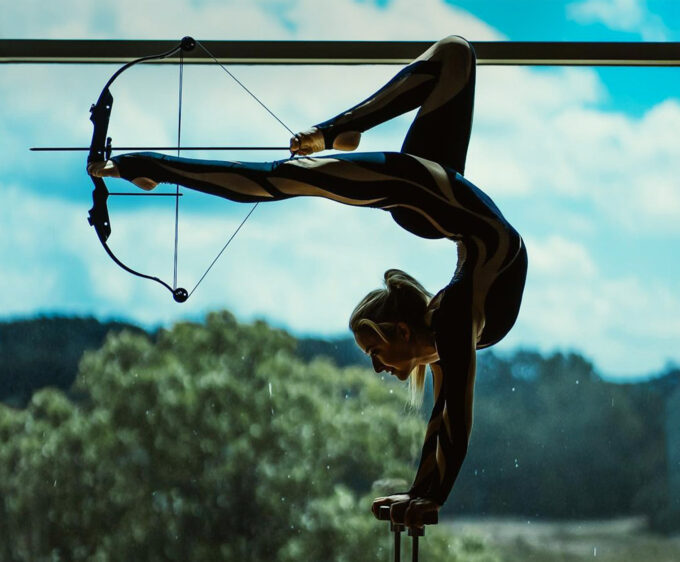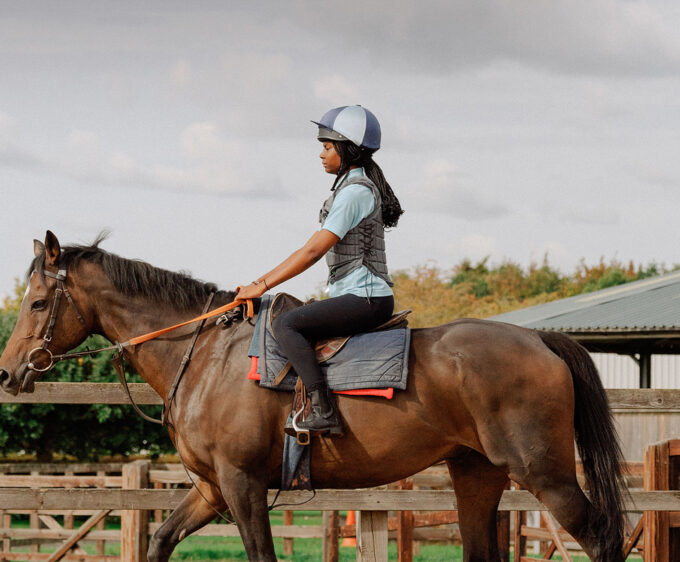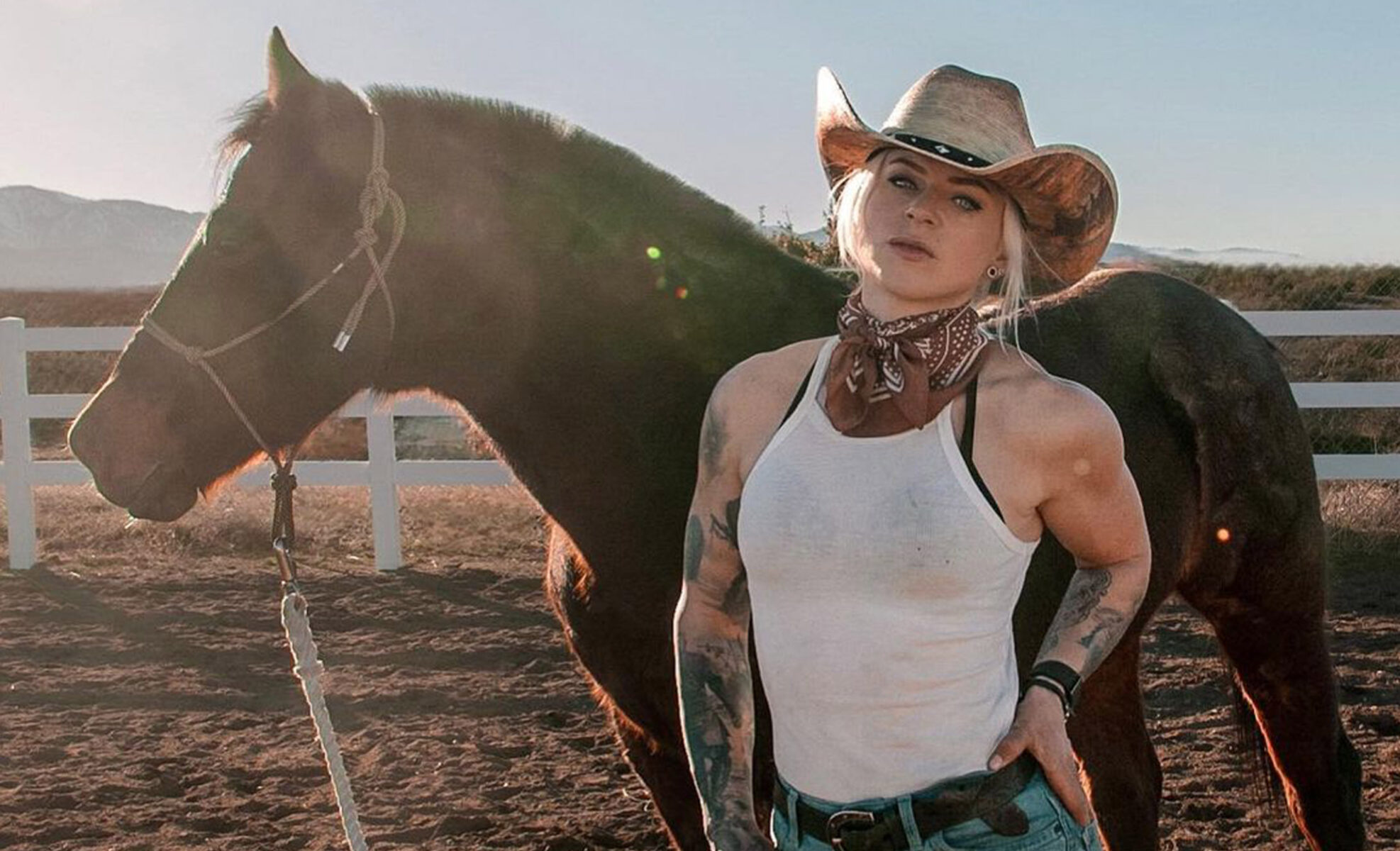
The Horse Whisperer
Horse trainer extraordinaire Julia Williamson shares her passion for horses and how best to rehabilitate and connect with them to form a wonderful horse-human relationship
By Glorious
Julia Williamson grew up in Germany and spent much of her childhood at her grandparents’ dairy farm, who she credits for teaching her so much about animal welfare. Horses in particular have fascinated Julia for as long as she can remember, she began riding aged 4, and it is her love of a horse’s characteristics – softness, power, elegance and intelligence, that made her follow her passion into a career as a horse trainer. In 2019 Julia moved her horse training business from Germany to High Desert in South California, establishing the Horse Center. It’s here that she shares what she has learned about horses and what horses have taught her, teaching people and horses to understand the “Why” to progress human-horse relationships.
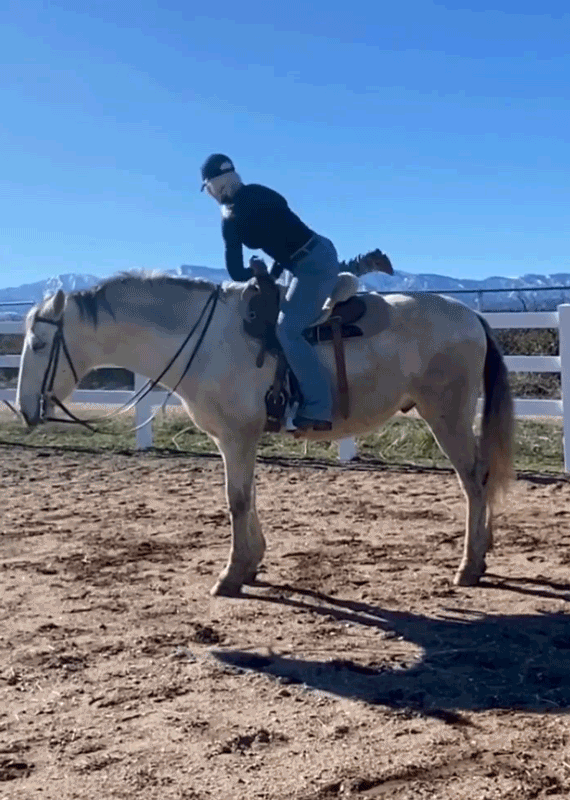
Glorious: What is the aim of The Horse Center?
Julia Williamson: All breeds, all genders and all ages are welcome at my training center. From unhandled to high level performance horses, I welcome any shape of horse and any training level at my facility. I want to create a safe learning environment for a horse in which I can help it find and choose its own strengths. Unfolding a horse’s talents and finding true joy in engaging with humans, all wrapped up with keeping a horse’s physical health in mind, so that we can aim for a horse to have a long, happy and fulfilling life. In order to do so, I pay close attention to drawing the connection between the correctness of the equine biomechanics and physical training, as well as challenging and developing the cognitive abilities of the horse. Training on all levels – physically, mentally and on a compassionate level is what enables me to create this wonderful connection between horse and owner. There’s countless training methods, philosophies, approaches and techniques out there, and even though I describe my training methods as reward based methods, I’d like to go one step further.
Connection based training: When we throw all our training methods and gadgets out of the window, all that we are left with is ourselves. If the horse can’t see us for who we are, can’t feel our intentions and won’t let us into his own world because we keep our own walls up – all the endless hours of training would have been for nothing. It would be a one way communication, which doesn’t equal a relationship that we’re aiming for. A heart to heart connection is crucial if you truly want to unlock that next level of trust. And that lock won’t open with cookies nor with a training stick or a training flag.
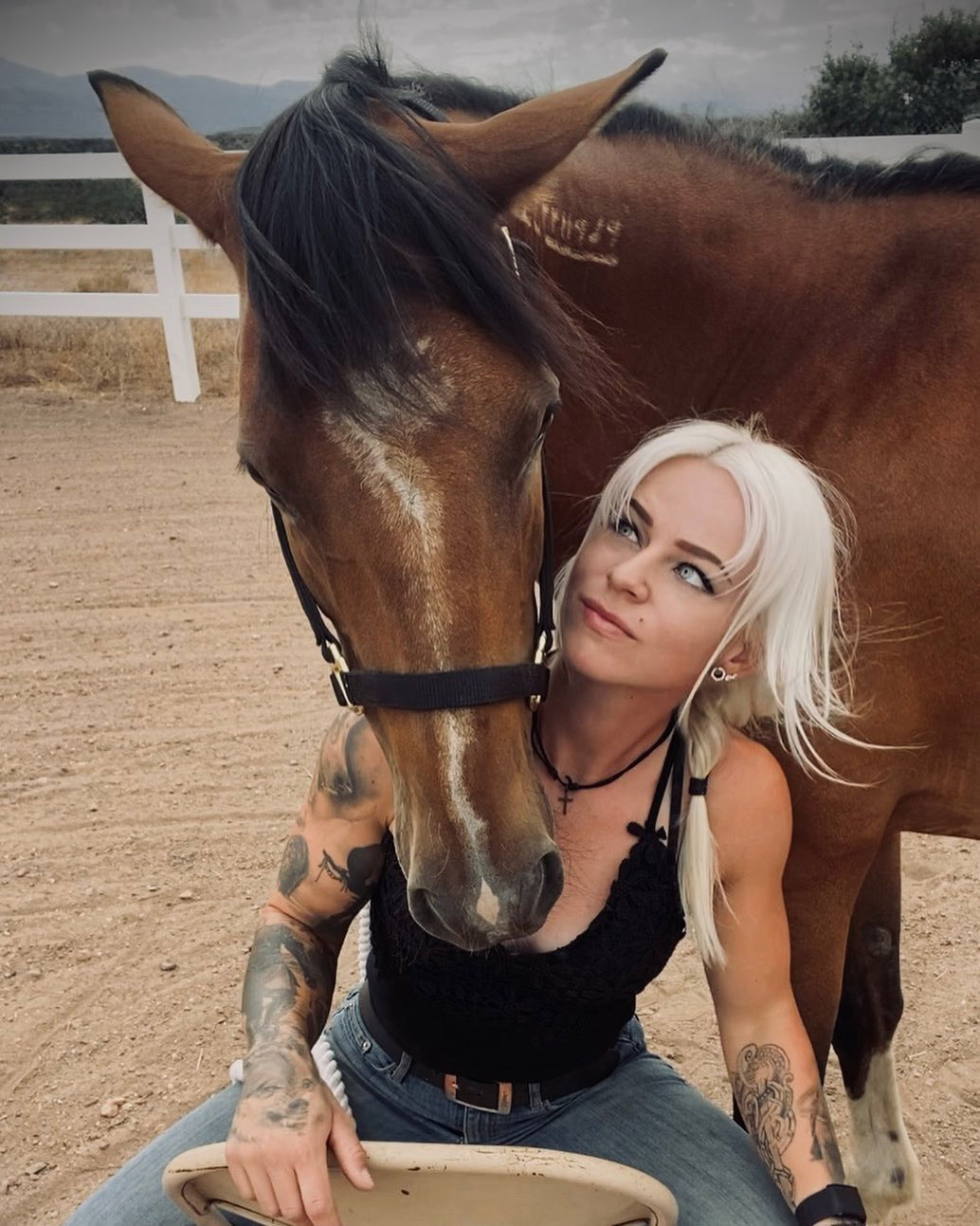
Glorious: How many horses do you have on the property at any one time?
Julia Williamson: Depending on the season, I train between 9-13 horses. The Horse Center is a one-woman show. I want every horse to get the attention and time they need, which means that I can only take on so many horses at a time.
Glorious: When did you discover horses? Did you grow up ‘horsey’?
Julia Williamson: I started riding when I was 4-years-old. I grew up in a small rural village in Germany, where you either played soccer or rode horses. My parents thought it was a good idea for me to have a hobby that taught me to take on responsibility for another living being. A hobby where you have to show up because your pony needs to be fed come rain or shine and where chores need to be done before you can actually go and have fun. I caught the horsey virus pretty early on and it’s only gotten worse ever since.
Glorious: Glorious is London-based where it’s very rare to even see a western saddle! Did you grow up a ‘cowgirl’?
Julia Williamson: Growing up in Germany, it was very rare to see a western saddle. The western community in Germany has been growing fairly quickly over the past decades, however, I grew up riding dressage, show jumping and cross country. I learned a lot about horsemanship early on in Germany, but working with a western horse was rare. When I first came to the States I had to refresh my knowledge on how to cinch the saddle correctly, the difference of the disciplines and its historical backgrounds. Refreshing my knowledge about the difference of the cues that we need when we work cattle in comparison to when we aim to compete in a western dressage class was a very humbling experience. I love to learn new things. If you stop learning your trade, you stop being good at what you’re doing. Even if you learn something that doesn’t resonate with you at all, it’s still valuable information.
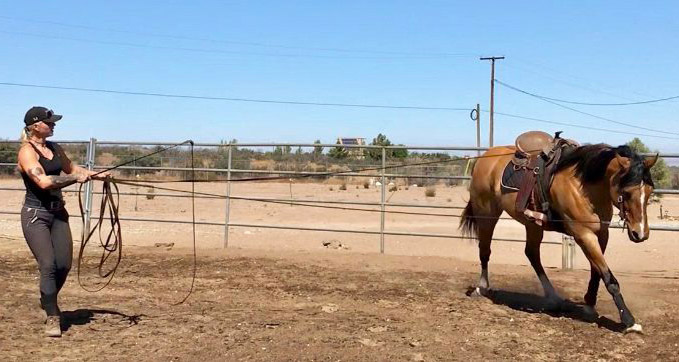
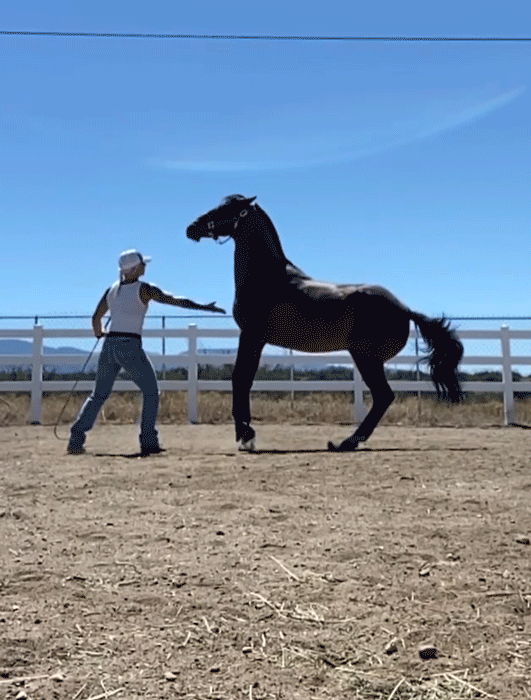
Glorious: When did you realise you had a knack for training horses?
Julia Williamson: Growing up in a rural area we never had access to a lot of trainers or clinics. When you own a horse you become creative out of necessity. You run into problems and situations where you can’t just call someone or look at a YouTube video – the internet didn’t exist then as it does now. You’d have to wait until you saw your trainer again, or simply do it yourself. More often than not, things didn’t work out the way I intended them to, but it taught me a lot.
communication
Glorious: Your approach to rehabilitating and training horses is refreshing, you believe in building a bond without force, please tell us a little about your method/ methodology?
Julia Williamson: The golden rule of my philosophy is to always keep respect for the horse and its nature. This means that you must understand the horse from head to toe. The horse experiences the world differently than humans – Mother Nature shaped the horse to allow it to repopulate and survive in the world. This means it smells, sees, hears, tastes, processes information, interacts and reacts to its environment differently to humans.
As soon as we use human labels for a horse’s behaviour that seems out of place, that we take personally or that we simply can’t explain, the human-horse interaction is jeopardised. All of a sudden the horse is labelled as stubborn, pushy, mean, dominant, bossy, submissive, disrespectful, lazy or mean.
The problem with labels is that they’re very subjective. What you might consider as lazy, I consider as relaxed. Labels don’t help us to address what’s actually going on underneath the surface. When you tell me that a horse is dominant, you’re telling me that you’re feeling overwhelmed and threatened by his presence – but it doesn’t actually communicate the information we need to change the actual behaviour of what’s going on.
If you tell me that every time you walk him from the pasture to the barn he gets ahead of you, walks with his head up high and won’t respond to your cues – this gives us much more to work with. We try to make sense of the horse’s behaviour by humanising them. This isn’t ok and it’s when the biggest training mistakes happen. When we start to punish fear, or try to lock up energy when it needs to be released is when things become unfair.
A lack of fairness creates a one-sided communication. You experience the horse as being dominant, he intimidates you and makes you fearful. Because you’re feeling defeated and insecure, you’re now yelling at the horse and yanking on his lead rope. He still doesn’t listen so now you slap him in front of his chest with the end of the lead rope. If you had truly listened to your horse in the first place, you would understand that what you were experiencing as dominant behaviour was actually high level anxiety in your horse, causing him to walk faster and get tense to the point where he wasn’t able to take in further information. So the horse was punished for being anxious.
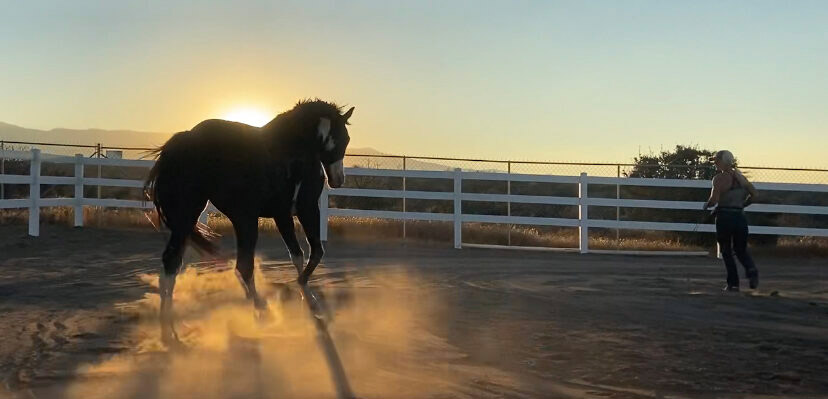
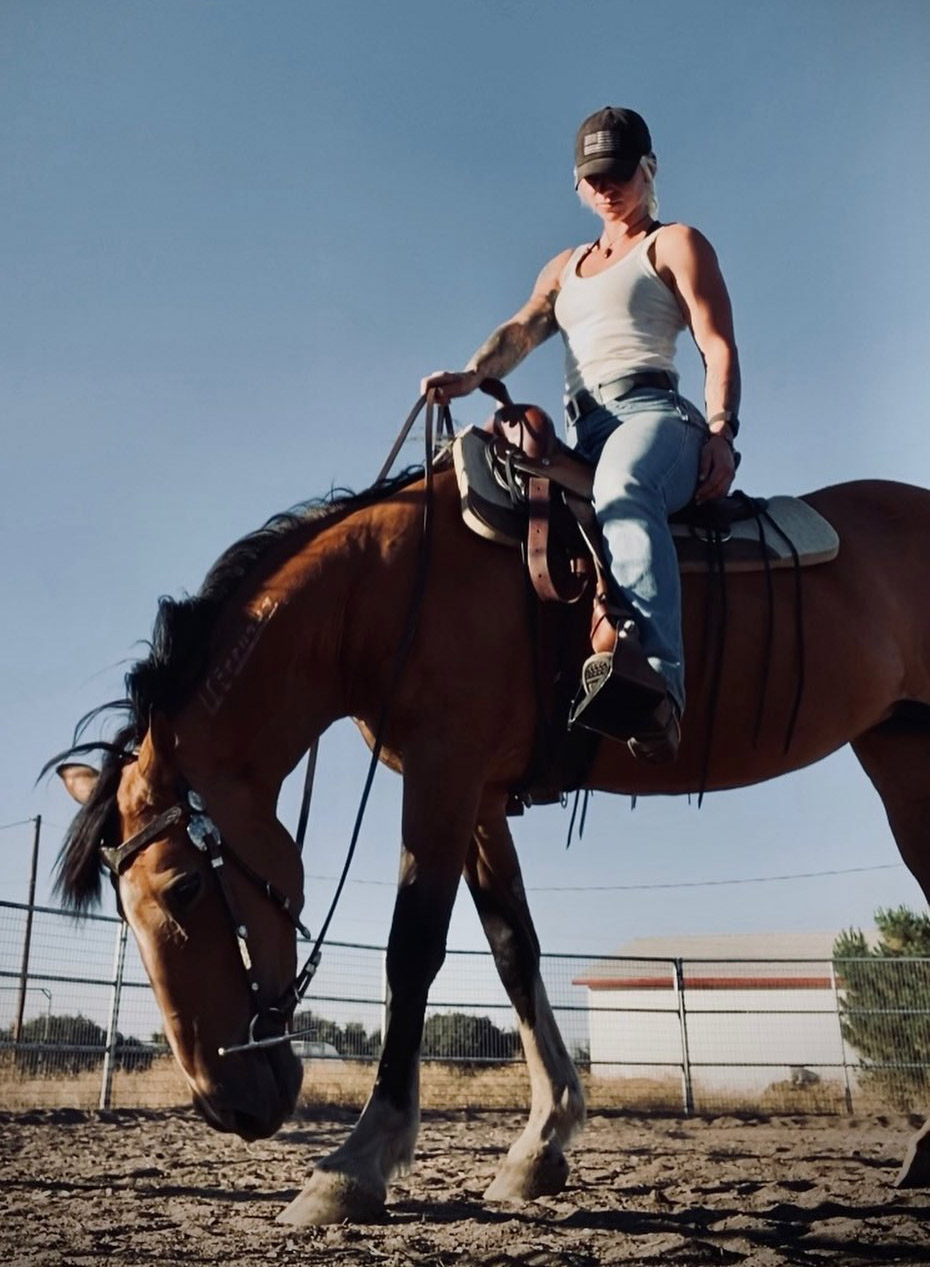
Glorious: What is your proudest training moment? Is there one particular horse that stands out in your career as one of your favourite projects?
Julia Williamson: There‘s not one particular training moment that sticks out. I believe that’s the beauty about training. You witness and go through many small important moments of success and also moments where things don’t go as planned, but they still give you a deep insight and ah-ha moments that are crucial in order to be able to recalibrate and make progress. Many horses have crossed my path that have moved me deeply and will always have a place in my heart for allowing me to be part of their journey and share their wisdom.
Glorious: How do you acquire the horses? Do owners send you their horses or do you buy/ rescue them then train them?
Julia Williamson: I train horses for the public, which means owners send me their horses and they stay for a certain amount of time. Alongside my main business of training horses for their owners, I try to keep 1-2 stalls open to offer horses in need of a soft landing. It’s a heart project of mine. Right now my rescue spots have been full for the past 2 years.
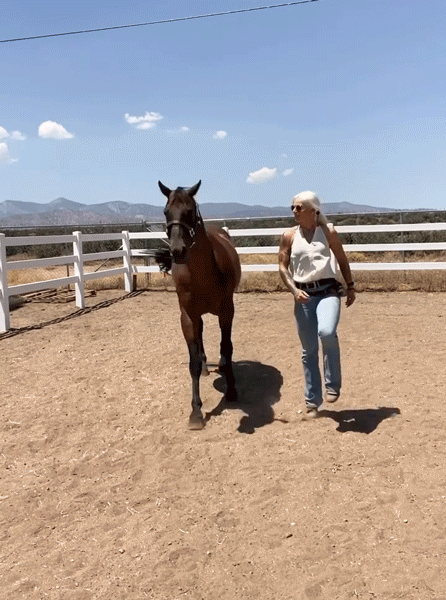
Glorious: Do you believe all horses are able to be rehabilitated and / or trained?
Julia Williamson: This is a very ethical question.. I don’t believe all horses are able to be rehabilitated and trained. It is rare, but occassionally there are some cases when we have to deal with neurological or health problems that are so severe that extending the horse’s life would do more harm than good for the horse and it could put the safety of the horse and human at risk.
We also have to factor in time. Severe cases of “problem horses” or “traumatised horses” might have a chance of being fully rehabilitated and retrained but it might take a couple of years. Decompressing and regaining trust takes time, and on top of that, it takes even more time when we’re dealing with health problems. This timeline might not always align with the horse owner’s plans nor his or her financial capabilities.
Emotion
Training, lessons, potential vet bills/regular body work and physiotherapy are all costly. I believe we can find the right form of life and “job” for every horse. Does this always mean that the end result will see us galloping bareback and bridleless across an open field? Absolutely not. Sometimes the best we can do is to create a pain-free or stress-free living situation for the horse. Some horses that have experienced severe trauma and abuse simply deserve their peace. There’s no need to put further stress and pressure on a horse during training when all that the horse has desperately left to say is, “Please just let me be..”
The only need that comes to my mind in these cases is our selfishness of wanting to help this animal. The notion of turning an untouchable and shy horse into a lifelong companion is very romantic and fulfilling to most people. It is doable, but it doesn’t come easy and you’ll probably eat more humble pie than you’re ready to swallow. In my experience the most selfless thing to do in certain cases is to accept the reality of the situation rather than keep getting hurt or putting yourself and the horse into danger.
Glorious: Once a horse has lost trust in a human, how difficult is it to gain it back?
Julia Williamson: It totally depends on the horse. Some horses react with aggression and frustration, while others will shut down and zone out when they lose trust in a human. First and foremost, you need to be honest. Honest with yourself and the horse. Don’t try to hide emotions or intentions. It communicates a blurry picture to the horse which raises suspicion and creates tension. They instantly feel and sense that we are holding back. When we hold back – they won’t open up.
Horses can sense each other’s heartbeat. Mother Nature installed this skill inside them so they can communicate with each other within split seconds if a potential threat is looming. Once a horse senses danger – its heart rate naturally increases – other horses close by will instantly sense their heart rate and be alerted to the potential threat.
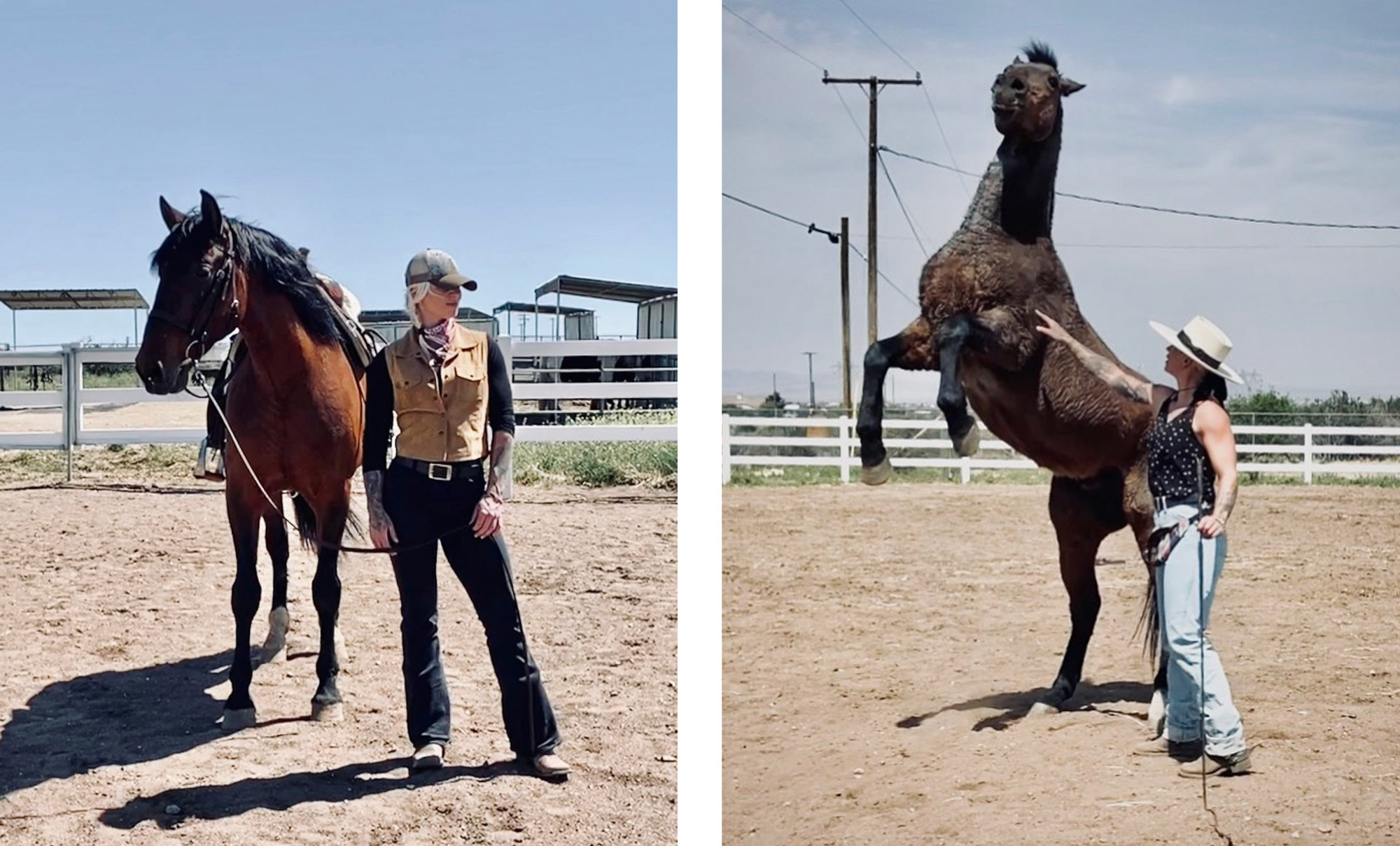
Humans aren’t prey animals, so we can’t ‘pretend’ to be a horse since all our human features give away that we are clearly a predator. Our eyes are directed forwards, we’ve got sharp teeth, claw-like hands, we smell like omnivores, however the horse can still sense our heartbeat. If what we try to communicate is different to what our heart tells the horse, you’ve already lost.
Horse Training isn’t rocket science, but you do see a big difference between “good”and “bad” trainers because the good trainers are usually also good at being honest with themselves. They’re able to control their emotions and keep their intentions pure. They know how far to push or when it’s too much. Their emotional intelligence is so important and their deep empathy allows them to feel for what’s right or wrong and how to gain that horse’s trust back.
Glorious: What do you wish could change in the horse training world?
Julia Williamson: I wish that we could all come a little closer together. Just like in any other sport, there’s endless opinions on everything. People split into groups. They take sides and become lost in discussions about who knows what and who doesn’t, how they’re right and everyone else is wrong. Training methods or trainers can get bashed and shamed into the ground over a small disagreement. At the end of the day, I ride a horse. Not a discipline, not a certain type of saddle, not a certain style, not a certain training method. I ride a horse. We all do. We own horses because we love how they make us feel. We love to devote and share our time with them and to collect lots of unforgettable moments. Bashing our fellow horse lovers is just something that doesn’t make sense to me. We all make mistakes and we can all do better when we know better.
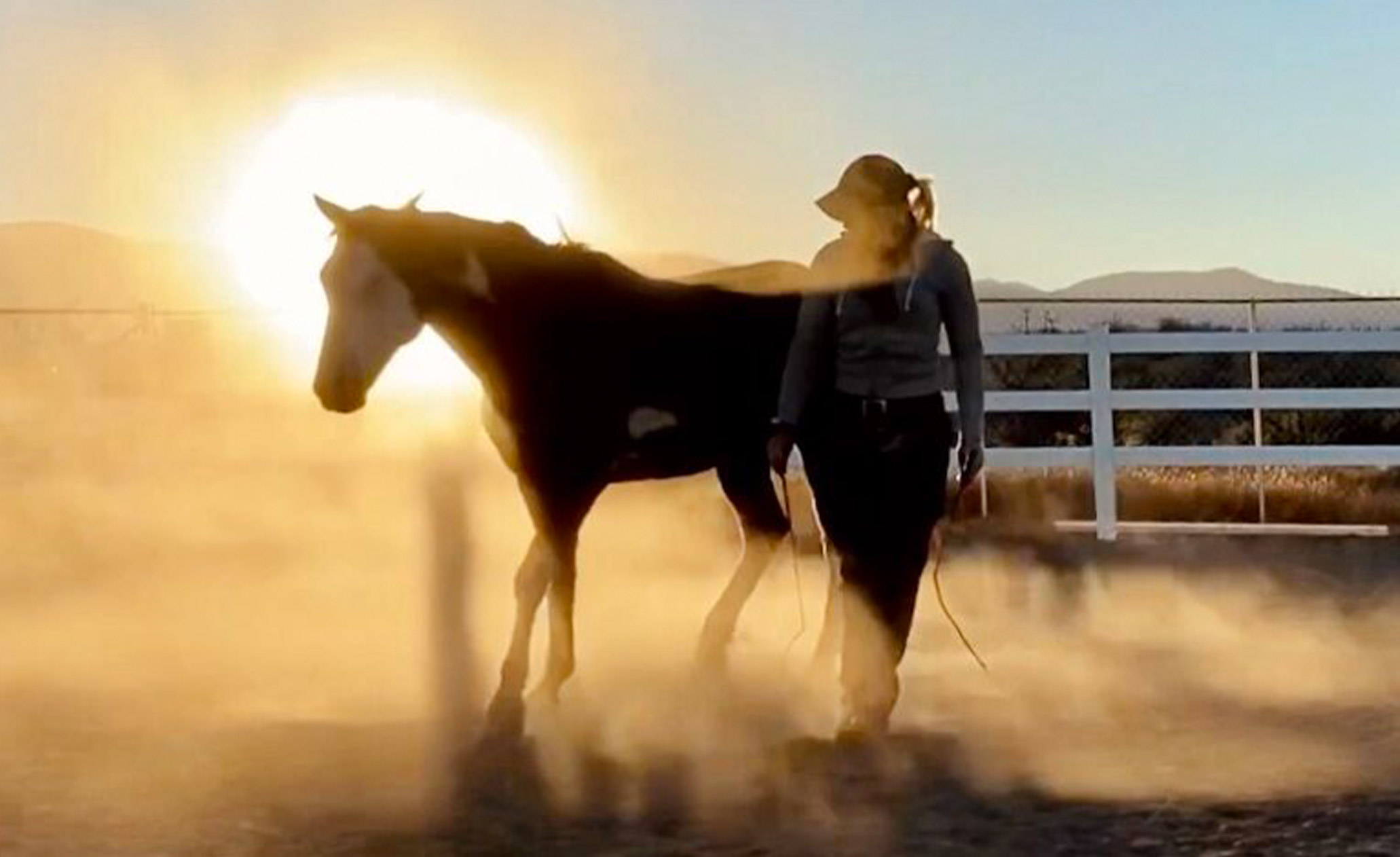
Glorious: Have you always had an affinity to animals? From your social media, your dog seems to be super trained also!
Julia Williamson: Growing up we always had animals. My grandparents had a small dairy farm in Germany which is where I spent a lot of my childhood. Due to its size it was a completely family-run business. We’d all come together to help. The hay harvest was always one of the big get-togethers. All my uncles, aunts and cousins would help to bale the hay, load it by hand into the trailer, haul it home, unload it at my grandparents hay attic and stack the hay in 110°F underneath the roof. Afterwards we’d have a huge dinner. We’d sit together, cats and dogs running around, chickens, ducks, geese, sheep, cows .. right there next to us. Chatting all night long before we’d crash exhausted but happy. My grandparents taught me a lot about animal welfare, the good, bad and ugly about owning and taking care of livestock and pets, the historical importance of ranches, how much hard work it takes and how fulfilling this life can be.
Glorious: How does it feel to have such a large social media following and do you feel a responsibility to the horse world when sharing your content?
Julia Williamson: It was a little overwhelming when it began to grow this big. I’ve always shared a lot of my daily work and my philosophy via social media because I want to keep my work as transparent to the public as possible, as well as educating people, but I would’ve never thought that it would grow this huge.
I choose to be very intentional in my life. When I post or share something, I prefer to have a reason and a depth to it that can give someone else value in some form. Whether that’s mindset related, life related or actual hands-on horse training techniques. The wisdom of the horse and my daily work with them is something that brings not only joy and happiness to people but also support, reassurance and motivation, and I am happy that I am able to share these insights with my following.
technique
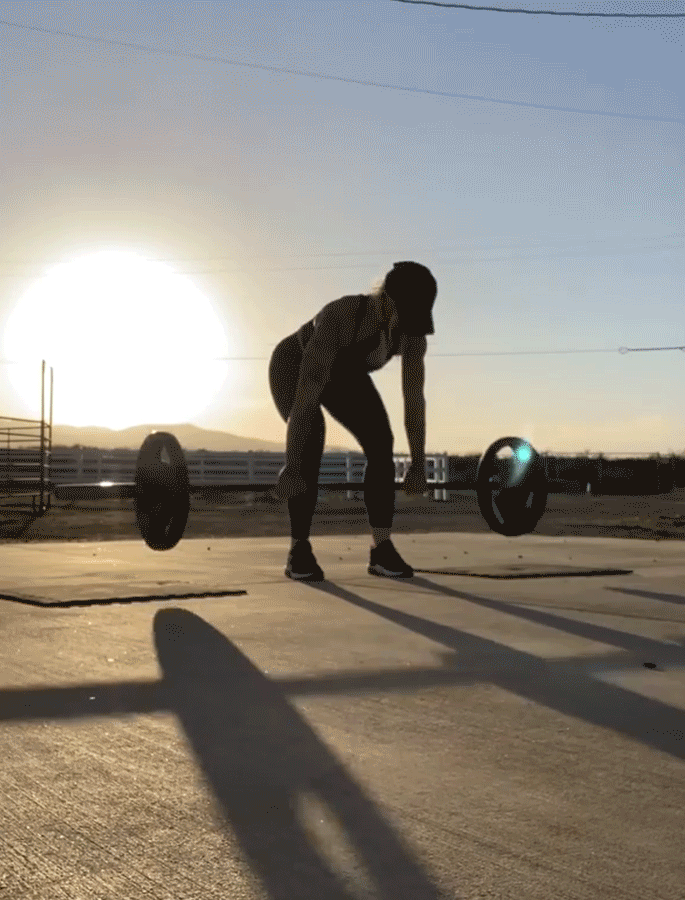
Glorious: Were you / are you into any other sports? Did you play sports at school?
Julia Williamson: As I grew up in Germany, I never played any sports like they exist here in the United States. I did play some soccer and volleyball at school, but it was never highly competitive. I was always a very clumsy kid so gymnastics was directly off of my list at school. I was also pretty chubby and had my baby chub until I was around 15-years-old. This is when I started to pick up cross-country running to build my endurance for riding horses. At 18 I got into weightlifting, which is my outlet these days next to running the ranch and working horses.
Glorious: Do you still watch/ play any other sports?
Julia Williamson: I hit the gym 5-6 days per week. Usually first thing in the morning when I get up before I go to feed the horses.
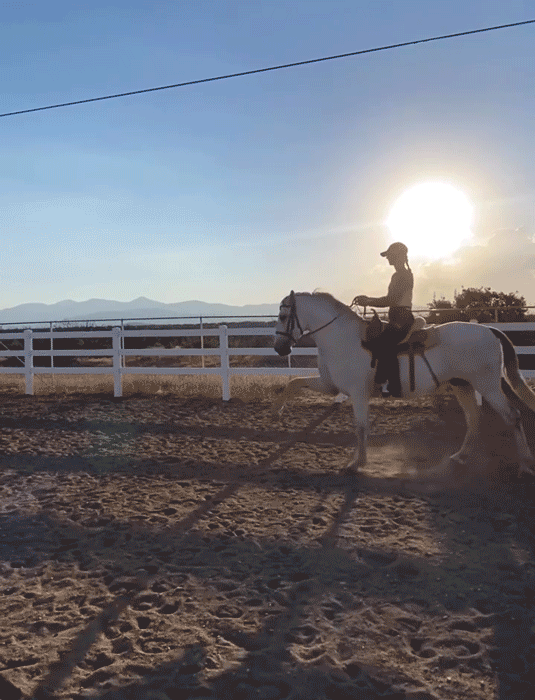
Glorious: If you could invite 4 influential women to join you for dinner, who would you invite and why?
Julia Williamson: That’s a good question. I don’t believe I’d go the conventional route of influential women. If I could travel back in time I’d like to sit down and have dinner with Mary Fields who was known as Stagecoach Mary. Born into slavery, emancipated and made a name for herself. Fearless, relentless, a big heart and a huge personality with endless layers to it. It would be a pleasure to have dinner with Mother Teresa who devoted her life work to the poor and dying.
Sacagawea the Native American woman who showed Lewis and Clark the way on their expedition. She not only helped to overcome the language barrier during guiding the most famous American expedition, but she also found valuable plants for food and medicine to help keep the explorers alive. Joan of Arc, the teenage girl who led a French army to victory with no military training, purely following her intuition and having faith that she’s fulfilling her life‘s purpose by listening to the God sent messages she received.
Glorious: When and where do you feel your most happy and relaxed?
Julia Williamson: Every day, in the evening after I’ve fed all the horses. This is when I know that I’ve completed all my chores, all the horses have been exercised and everyone’s fed. The sound of horses munching their grain and hay, the day coming to an end, watching the sunset… that’s just the most relaxing thing to me.
Glorious: What’s next? We listened to your podcast and loved it! A new season perhaps?!
Julia Williamson: Life has always put me into the right places at the right time. I don’t have a 5-year plan. My main priority is to keep training horses for my clients and as a result of that, share my insights and knowledge.
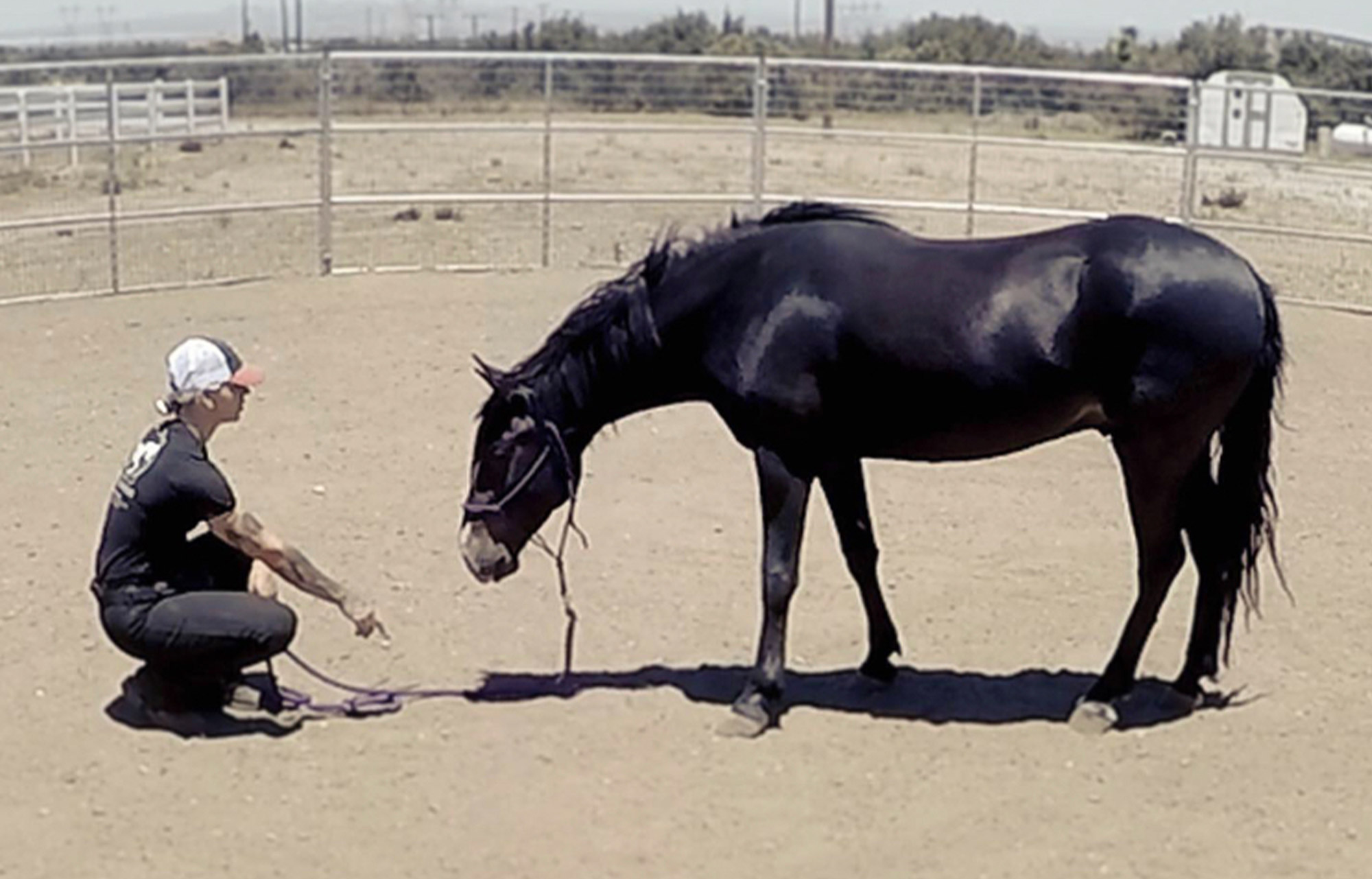
I recently adopted two Spanish Barb Stallions who are listed as critically endangered. There’s less than 3,000 of these horses left worldwide. They were brought to the New World by Spanish Explorers in the 1500’s. The Spanish Barb horse adapted, endured and survived the epoch of exploration, conquest and colonisation, and continued through the age of settlement of the American West. (Source: International Museum of the Horse) I am part of a breeding recovery program in order to preserve these endangered horses.
Fancy Dude and Red Sands, both 6-year-old stallions, were completely unhandled when I picked them up. I’m currently in the process of gentling them and documenting their entire transformation. Their videos will be released in due time in order to raise awareness for these horses to avoid their distinction. These two boys are currently my personal heart project and I am beyond excited to have the honour of being part of their journey.
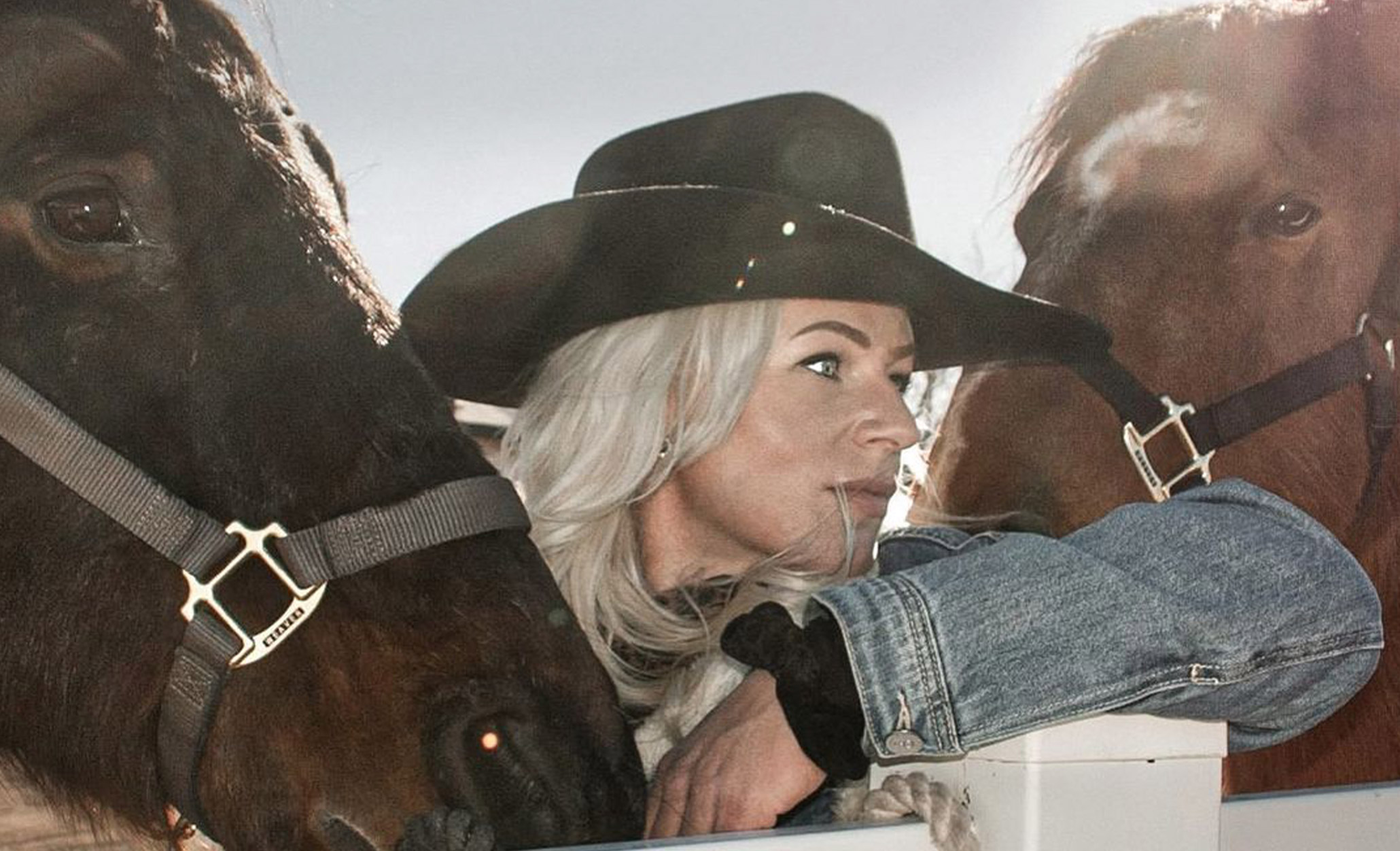
Editorial Design by this is root

